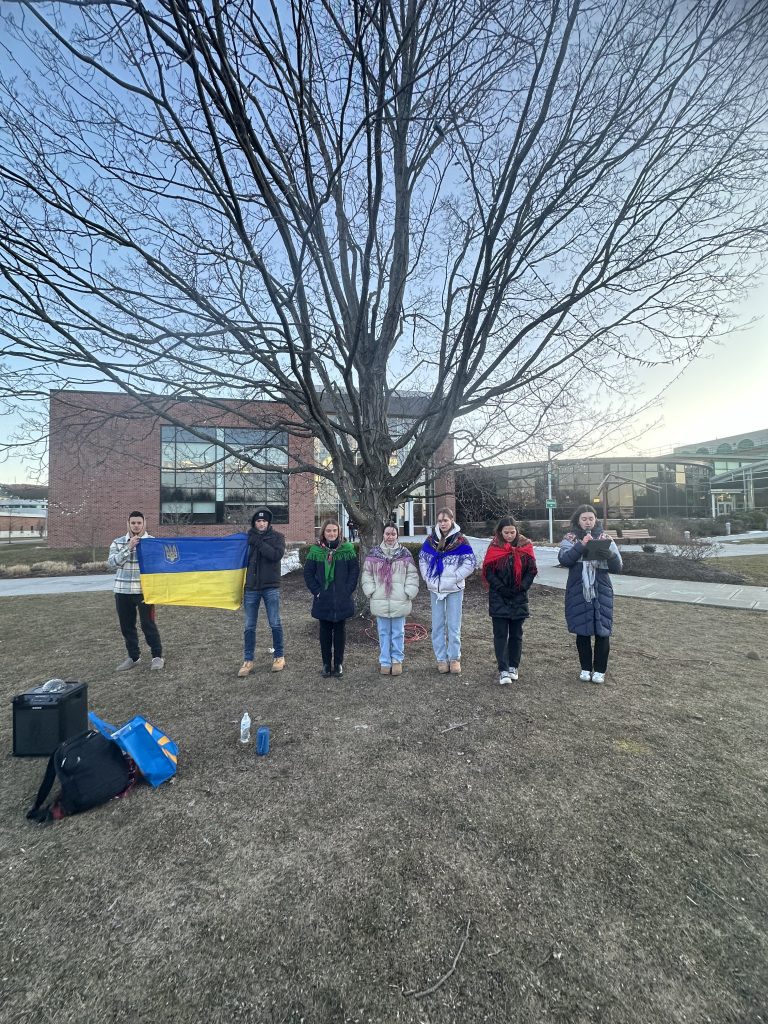In observance of the second anniversary of Russia’s full-scale invasion of Ukraine, the recently formed Ukrainian Cultural Association held a vigil on Saturday.
Beginning at 5:30 p.m. on the Peace Quad, participants heard firsthand accounts about the realities on the ground. The vigil was followed by a screening of “20 Days in Mariupol,” a documentary filmed by an Associated Press team of Ukrainian journalists. The film documents Russian atrocities committed in their army’s siege of Mariupol, a coastal Ukrainian city.
Julia Biggs, the organization’s president and a sophomore majoring in nursing, said she believes that acknowledging Ukraine’s history is essential to understanding their people’s endurance and resilience.
“We just want to bring awareness to the fact that Ukraine has been fighting for democracy for itself and to be a sovereign nation for quite some time,” Biggs said.
In 2013, Russian-backed Ukrainian President Viktor Yanukovych abruptly withdrew from a planned association agreement with the European Union, which sparked protests — now referred to as the Maidan Uprising, referring to the central square in Kyiv, Ukraine’s capital, where the protests first began.
The conflict’s recent escalation has had wide-reaching consequences throughout the campus community. Many students have family living in Ukraine, including Sophia Myshchuk, the association’s vice president and a junior majoring in biology, whose parents are Ukrainian immigrants.
“For me, it’s very personal,” Myshchuk said. “It’s something that really touches my heart.”
Russia’s invasion has led to the largest refugee crisis in Europe since World War II.
Several BU students have fled their homes, including Maxim Jhor Harazha. While he was born in New York City, Harazha lived in Ukraine until the invasion forced him to return to the United States. He said the adjustment would have been even more difficult without the support of the association, which works to uplift Ukrainian voices on BU’s campus and celebrate their unique culture and history.
Roman Raguso, an association member and a senior majoring in computer science, his sister Kalyna Raguso, the organization’s treasurer and a sophomore majoring in neuroscience, and Biggs all have family living in Ukraine’s west.
“At night, they hear missiles going over their homes,” Biggs said. “It’s just really scary and a lot of people here are directly affected.”
In the city of Mariupol, thousands of residential homes, two hospitals, and a theater operating as a civilian shelter were targeted. The civilian death toll in Mariupol is conservatively estimated to be around 10,000. Human rights abuses have occurred throughout Russian-controlled areas in Ukraine, including in Bucha, where Russian soldiers conducted a “cleansing” operation that entailed going door-to-door torturing and executing civilians they deemed threatening and shooting people in the streets.
These incidents, as well as rampant sexual violence under Russian occupation against girls and women of all ages, were highlighted during the vigil, capturing the scale of devastation caused by this conflict.
Biggs and Myshchuk delivered parts of their speeches in Ukrainian, a language that has been historically suppressed by Russia. The ceremony concluded with the playing of the Star Spangled Banner, followed by the Ukrainian national anthem — a demonstration of unity between the two nations. The organization thanked the United States and other allies, like Poland and Canada, for their aid and support and stressed the importance of individual action.
“It is [the victim’s] courage and strength that inspires us to advocate tirelessly on their behalf,” Myshchuk said. “Ukrainian spirit can not be broken. In gathering to commemorate the two-year mark of the war, let us renew our commitment to Ukraine, that we stand shoulder to shoulder and provide her with unwavering support, so that people’s cries are heard and their dreams of freedom are made reality.”



